Serendip is an independent site partnering with faculty at multiple colleges and universities around the world. Happy exploring!
EvoLit 2011: Evolution beyond biology, a "universal acid?"
- Darwin's birthday: 12 February 1809 (A nationwide day for honoring Charles Darwin, but handled with caution)
- A fight to win the future: computers vs humans
- Innovation far removed from the lab (NYTimes, 9 Feb 2011)
Adaptive diversity can result from undirected variation, "selection" (= differential persistance, regardless of intent) acts on that
- Methinks its like a weasel
- Biomorph breeder
- Evolution lab
- Evolution as reproduction with variability
Switch in story telling style from non-narrative foundational to narrative foundational to emergence
| Great Chain of Being | Fixed Entities, Tree of Life | Emergence |
 |
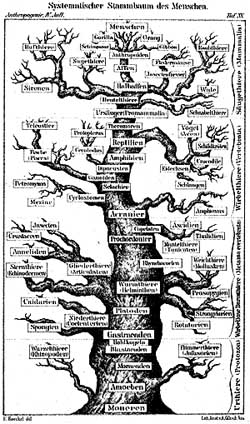 |
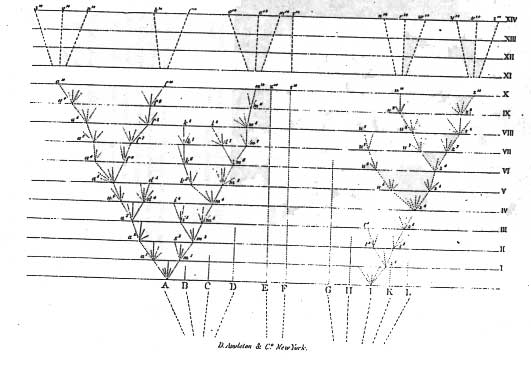 |
| spatial order, time irrelevant | time relevant, but playing out eternal or inevitable order | time critical, order changing as it goes along |

Given
- inheritance
- undirected reproductive variation
- differential reproductive success
- some degree of reproductive isolation
- enough time
It would be possible to account for the diversity of existing life forms on the earth (including Homo sapiens). One need not presume any plan or intention or goal.
 According to this story, living organisms, including ourselves,
According to this story, living organisms, including ourselves,
- are fundamentally variable
- had ancestors different from themselves
- will give rise to organisms different from themselves
- are defined by ancestry rather than any essential characteristics
- are accidents of history that might have been otherwise
- are equally significant in terms of the evolutionary process
- have additional "meaning" only insofar as it is created by organisms themselves
- no "selector", intentional agent
Most disturbing part of story?
- common ancestry (dethroning humanity)?
- non-essentialism? (dethroning classical thought)?
- non-foundationalism? (dethroning fixed meaning)?
Was Darwin writing "non-fiction" or "fiction"? Was he himself a non-foundationalist? Was he a pessimist?
"When the views entertained in this volume on the origin of species ... are generally admitted, we can dimly foresee that there will be a considerable revolution in natural history. Systematists ... will not be incessantly haunted by the shadowy doubt whether this or that form be in essence a species. This I feel sure, and I speak from experience, will be no slight relief ...
The other and more general parts of natural history will rise greatly in interest ... When ... we regard every production of nature as one which has had a history; when we contemplate every complex structure and instinct as the summing up of many contrivances, each useful to the possesser, nearly in the same way as we look at any great mechanical invention as the summing up of the labour, the experience, the reason, and even the blunders of numerous workmen; when we thus view each organic being, how far more interesting, I speak from experience, will the study of natural history become!
A grand and almost untrodden field of inquiry will be opened, on the causes and laws of variation, on correlation of growth, on the effects of use and disuse, on the direct action of external conditions, and so forth ... The whole history of the world, as at present known ... will hereafter be recognized as a mere fragent of time, compared with the ages which have elapsed since the first creature ... In the distant future, I see open fields for far more important researches. Psychology will be based on a new foundation, that of the necessary acquirement of each mental power and capacity by gradation. Light will be shown on the origin of man and his history.
Authors of the highest eminence seem to be fully satisfied with the view that each species has been independently created. To my mind it accords better with what we know of the laws impressed on matter by the Creator, that the production and extinction of the past and present inhabitants of the world should have been due to secondary causes, like those determining the birth and death of the individual. When I view all beings nog as special creations, but as the lineal descendents of some few beings which lived long before the first bed of the Silurian was deposited, they seem to become ennobled ... we may feel certain that the ordinary succession by generation has never once been broken, and that no cataclysm has desolated the entire world. Hence we may look with some confidence to a secure future of equally inappreciable length. And as natural slection works solely by and for the good of each being, all corporeal and mental endowments will tend to progress toward perfection.
It is interesting to contemplate an entangled bank, clothed with many plants of many kinds, with birds singing on the bushes, with various insects flitting about, and with worms crawling through the damp earth, and to reflect that these elaborately constructed forms, so different from each other, and dependent on each other in so complex a manner, have all been produced by laws acting around us .... Thus, from the war of nature, from famine and death, the most exalted object of which we are capable of conceiving, namely, the production of the higher animals, directly follows. There is grandeur in this view of life, with its several powers, having been originally breathed into a few forms or into one; and that, whilst this planet has gone cycling on according to the fixed law of gravity, from so simple a beginning endless forms most beautiful and most wonderful, have been, and are being, evolved." (pp 394-398)
What about "survival of the fittest"? "nature red in tooth and claw"?
Not phrases Darwin used, nor actually expressive of his perspective (cf Charles Darwin, Aboitionist)
Herbert Spencer, sociologist/philosopher, Principles of Biology, 1864 ... social darwinism
Different, somewhat conflicting stories about evolution, Spencer won for a while
Further evolution of the story of evolution to come ... things Darwin didn't know about
- time span
- genetics
- the impact, creative potential of randomness
- the brain as a story teller
- order/meaning from randomness?
The challenge: can we usefully see literature, culture, other things in these terms? If we think about literature/culture/other things, what new issues does it raise about a contemporary story of evolution?
Biological inheritance is not the only mechanism of evolutionary change
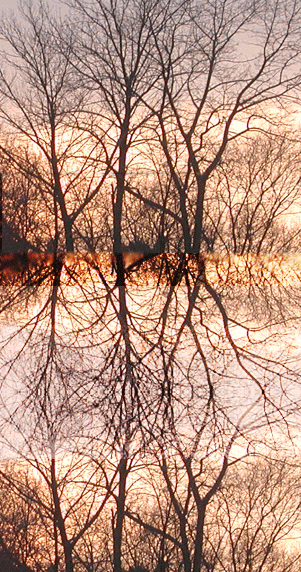
- lateral spread of genetic information
- impacts of individual and social behavior on differential reproductive success
- individual and cultural change itself
How do we think of individual change, of culture and cultural change? Is it all genetic inheritance or is there something different/more involved?
"Psychology will be based on a new foundation, that of the necessary acquirement of each mental power and capacity by gradation. Light will be shown on the origin of man and his history." ... Darwin, Origin of Species
"[Evolution] is a dangerous idea. My admiration for Darwin's magnificent idea is unbounded but I, too, cherish many of the ideas and ideals that it seems to challenge, and want to protect them ... I want to protect the campfire song, and what is beautiful and true in it ... The only good way to do this is to ... is to cut through smokescreens and and look at the idea as unflinchingly, as dispassionately, as possible" ... Daniel Dennett, Darwin's Dangerous Idea, pp 21-22
"There is no denying, at this point, that Darwin's idea is a univeral solvent, capable of cutting right to the heart of everything in sight. The question is what does it leave behind? I have tired to show that once it passes through everything, we are left with stronger, sounder versions of our most important ideas. Some of the traditional details perish, and some of these losses are to be regretted, but good riddance to the rest of them. What remains is more than enough to build on." .... Daniel Dennett, Darwin's Dangerous Idea, pp 521
Is Dennett successful? Is it an adequate extension of a non-foundational narrative story? Are we happy with it? If not, why?
Dennett Overview:
| Wonderfully Useful | Iffy | Problems? |
| universal acid
greedy vs proper reductionism cranes vs skyhooks nice tries emergent meaning/intentionality cultural transmission |
"selfish" genes
selfish memes algorithms forced moves libraries, search landscape (akin to niches) |
genes and memes and selection and NOTHING else? individuals/cultures are cranes, no skyhooks no space beyond the "libraries"?
|
Daniel Dennett, empiricist?, foundationalist or non-foundationalist?, fiction or non-fiction?
| Bright/Educated (and sometimes out of control) |
Committed to (a particular kind of) Rigor in Thought | Some Times Too Much So? (and hence oddly timid? as well as limited?) |
| "To put it bluntly but fairly, anyone who today who doubts that the variety of life on this planet was produced by a process of evolution is simply ignorant, excusably ignorant in a world where three out of four people have learned to read and write" (p 46) | "It makes sense to err on the side of greedy reductionism, to try for the simple model before wallowing around in complexities" (p 396) | "If a ... brain were truly capable of non-algorithmic activity, and if we have such brains, and if our brains are themselves the products of an algorithmic process ... an algorithmic process (natural selection in its various levels and incarnations) creates a non-algorithmic subprocess of subroutine, turning the whole process (evolution up to and including ... brains) into a non-algorithmic process after all. This would be a cascade of cranes creating, eventually, a real skyhook! ... The position is, I guess, possible, but ... (p 448) |
The Problem/Solution for Dennett, for us?:
- "In the beginning was the Word ..." ("logos" -> intent, reason, cause)
- Possibility that it is not so (non-foundationalism), that intent/reason/meaning/esthetics were not present at the beginning, leading to ...
- "fears that the wrong answer [to whether evolution is the explanation] would have intolerable moral [and other] implications [no comfort/goodness/personal responsibility]" (Dennett, p 20], ie that things important to us would prove to be shams/illusions
- Dennett's solution ...
Selfish genes, selfish memes, exploration within a fixed landscape/library, emergent meaning/intentionality/morality within that constraint, a semi-inevitable outcome in which individuals, societies, cultures exist but have no causal significance
"Darwin has shown us how, in fact, EVERYTHING is just such a product [of mindless purposeless forces] ... Darwin offers us [a convincing explanation of how God is distributed in the whole of nature]: it is in the distribution of Design through out nature, creating, in the Tree of Life, an utterly unique and irreplaceable creation ... that wonderful wedding of chance and necessity ... [that] just happened to happen, in the fulness of time ... it did make the ivy twine and the sky so blue, so perhaps the song I love tells a truth after all ... it is surely a being that is greater than anything any of us will ever conceive of in detail worthy of its detail ... I can stand in affirmation of its significance." (p 520)
- Paul's problem (maybe yours?) ...
Admiration and awe is all very fine, but I want to be an agent, to MATTER, not only to be shaped by but to shape, to be more than a product of genes and memes.
science itself will teach man... that he himself is something of the nature of a piano-key or the stop of an organ... so that everything he does is not done by his willing it, but is done of itself, by the laws of nature....even if this were proved to him by natural science and mathematics, even then he would not become reasonable, but would purposely do something perverse out of simple ingratitude, simply to gain his point.... the whole work of man really seems to consist in nothing but proving to himself every minute that he is a man and not a piano-key! .... Fyodor Dotoevsky,Notes From Underground, 1864
Can we do better about individuals? about cultures? A different story ...
Step 1. The relation between evolution as a non-foundational narrative story and science
| Linear science | Seriously loopy, story teling science |
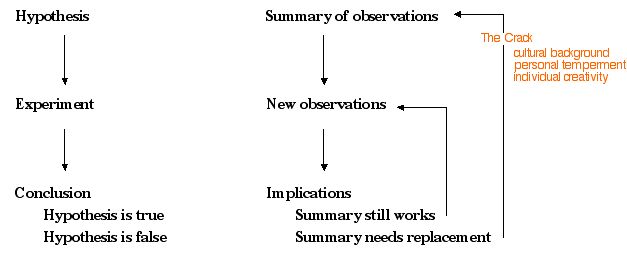 |
|
| Science as successive approximations to Truth
Non-narrative? |
Science as ongoing story telling and story revision: repeated making of observations, interpreting and summarizing observations, making new observations, making new summaries ... individually and collectively Science as skepticism, a style of inquiry that can be used for anything, one which everybody is equipped to to/can get better at/be further empowered by, and contribute to - a way of making sense of what is but even more of exploring what might yet be Narrative? (see The Nature of Science) |
Where in biological inheritance is the "crack"? "personal temperment," "individual creativity," "cultural background"? Are these simply direct consequences of biological inheritance, some of the "traditional details" that need to "perish," "losses to be regretted," or something more? And, if something more, do we need to look elsewhere for them or can they be accounted for within a non-foundational story that Darwin helped initiate?
Looking elsewhere for selves and cultures ...
Finding selves and cultures (plus) within evolution = emergence
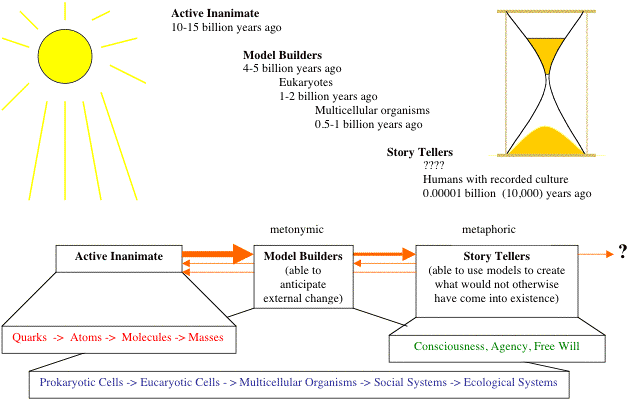
Individuals and cultures (including meaning, intention, esthetics) don't disappear, don't exist in some different parallel world, were not present at the beginning ...
They are instead themselves outcomes of an evolutionary process based in randomness and,
once having come into being,
they in turn become causal influences in that process, using randomness
Humans share with all other living organisms the wherewithal to explore forms of life,
and can do so as well though story telling
The story telling brain as a new development in evolution (a new form that in turn ...)
 |
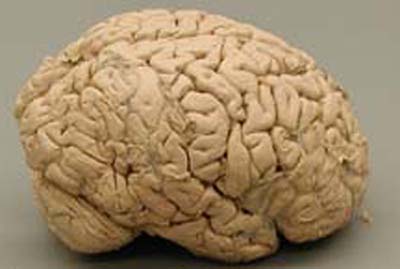 |
 |
Neocortex gives us the capacity to tell stories, to go beyond experiences, to conceive/explore/bring into existence new worlds, to create meaning using randomness and out of randomness
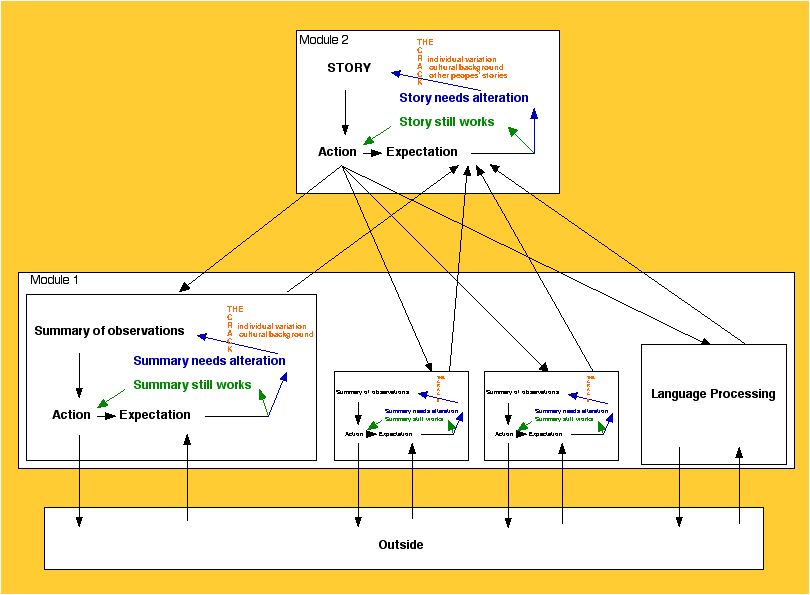
An unconscious AND a conscious "crack"
Both self and culture can influence story which in turn can influence unconscious
Conscious crack an accelerator of evolutionary exploration
Creates not only form but meaning and esthetics, personality responsibility, free will



